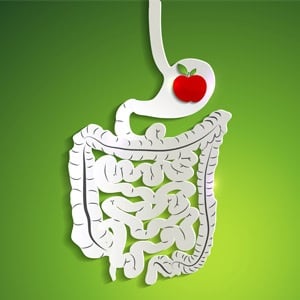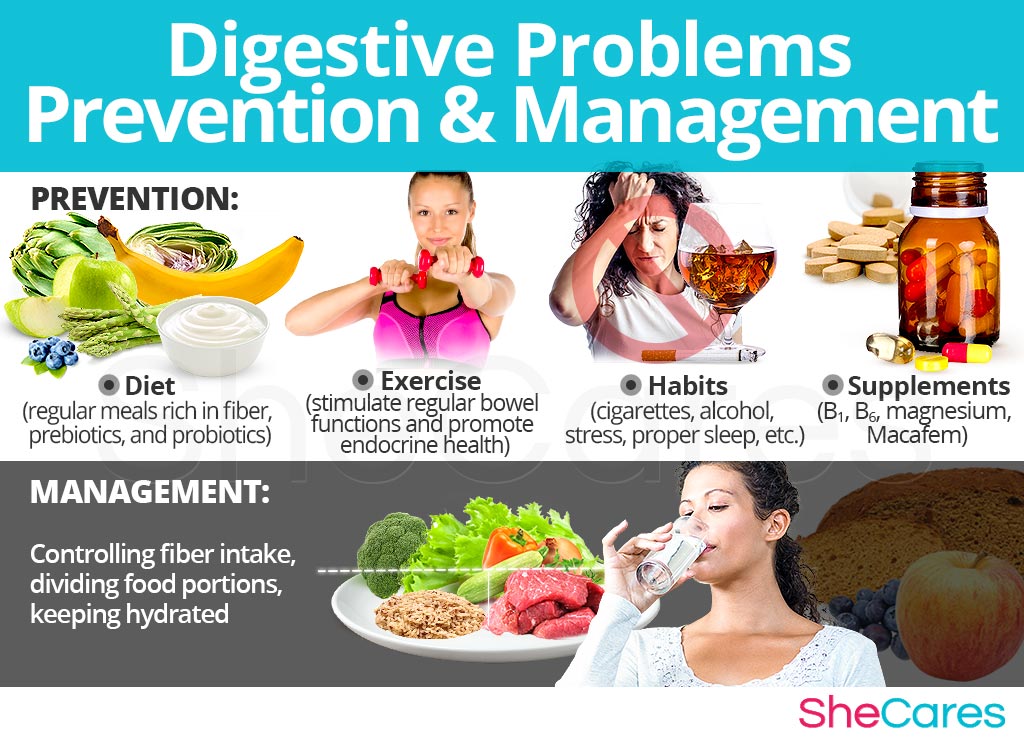
Video
Prevention, Detection, and Treatment of Diseases of the Digestive System - Biology AnimationPreventing digestive diseases -
Over time, factors such as lack of activity, medications, and every day habits can take their toll and contribute to digestive issues. When there is something that disturbs your digestive system, you will most likely experience unpleasant symptoms.
While some problems require a visit to your gastroenterologist, others may be related to your lifestyle and can be prevented. Taking caution and steps to improve your digestive health can not only protect and improve your long-term digestive function, but have a positive impact on your overall health as well.
Various things, that vary from person to person, can trigger digestive problems. You will have to identify what kinds of eating patterns, habits, and foods trigger digestive issues for you in particular. For some people, tricky foods can be dairy. For others, it can be gluten. Over the counter or prescription medication can also cause digestive upsets.
Since such triggers can vary from person to person, it is best to track your diet and medication to identify your personal triggers.
For instance, you can try an elimination diet to identify foods that irritate your digestive tract. You can also talk to your doctor to help identify any potential allergies and other food sensitivities. Inquire about any known side effects of any medication you are currently on to see if that is the culprit.
Certain activities such as travel and events such as menstrual hormones can affect your digestion also. If you suspect a connection, start taking note of foods and drinks, medication or supplements, and daily activities and events. You may start finding correlations between these tracked factors and digestive issues.
Fibre-rich food is highly beneficial to digestive function. Fibre adds bulk to your stool and keeps it moving smoothly through your digestive tract. A high-fibre diet is a key component in alleviating and preventing constipation. Increasing fibre intake prevents gas, bloating, and diarrhoea.
A fibre-rich diet also helps maintain a healthy balance of gut bacteria that play a big role in the overall health of your digestive system. So, consuming a diet rich in vegetables, fruits, whole grains, and legumes can help improve your digestive health and prevent many digestive ailments such as heartburn, irritable bowel syndrome IBS , haemorrhoids, diarrhoea, gas, nausea, and intestinal cramps.
You may have heard of soluble fibre with its growing popularity in food trends. It is a reputation, that is thankfully, well earned. Though dietary fibre is part of food that mostly passes through your system without being broken down too much, it plays an important role in our digestive function.
In addition, fibres play an important role in maintaining healthy body weight. Water is essential for good health and bowel function. It helps cleanse the digestive system and prevents constipation by softening stools.
It aids the digestive function by helping break down food and improving the absorption of nutrients by your body. Drinking plenty of water will help you avoid dehydration and help you stay hydrated if you are suffering from diarrhoea. Your aim should be to drink at least 8 glasses of water every day.
However, you should avoid sugary and caffeinated drinks — they can make digestive problems worse. Stick to sipping on bottled or filtered water. Consider incorporating probiotics into your diet. Probiotics are a combination of live beneficial bacteria and yeasts that live naturally in your digestive tract.
They combat the ill effects of a poor diet, stress, and antibiotics. Probiotics can help break down lactose, strengthen your immune system, help treat IBS, and improve nutrient absorption.
Fermented foods such as yogurt, kombucha fermented tea and kefir fermented dairy drink are good sources of probiotics. Regular physical activity has many bodily benefits which include maintaining a healthy weight, the most well-known use of exercise.
But getting at least minutes of muscle-strengthening and cardiovascular exercise every week will do more than get you on track of an overall healthy lifestyle. Exercise can, in fact, help maintain a healthy digestive function and aid bowel regularity by preventing issues such as constipation.
Further, maintaining a healthy body weight can also aid your digestive system. It is no secret that high-fat food or foods with high amounts of saturated fats are bad for you.
They increase blood cholesterol, increase the risk of heart disease, diabetes, liver disease, hypertension, and have many debilitating effects on your body. Unsurprisingly, fatty foods complicate normal digestive activity also.
Fatty foods strain the digestive process and slow it down. That is why digesting fatty foods when you have an upset stomach is much harder.
They also make you prone to constipation. However, it is important to get healthy or good fats, especially those high in omega-3 fatty acids, in your diet, and accompanying such food with high-fibre foods will help in easy digestion.
Your small intestine is a winding, tightly folded tube. It does most of the work of digesting food and absorbing nutrients. Large intestine colon. The part of your food that is not absorbed waste goes through the large intestine. Most of the water from your food is absorbed there.
The waste that is left is stool feces. It is pushed to the rectum. Your rectum is a short tube at the end of the large intestine. It connects your colon to your anus. The anus pushes stool out of your body. Liver, pancreas, and gallbladder.
Food and waste don't go through these organs. But these organs help your digestion. Your liver helps with the breakdown of food into the nutrients the body can use. Your pancreas makes digestive enzymes that break down food into nutrients.
Your gallbladder stores a fluid called bile that helps your body digest fats. Digestive problems may include: Constipation. This means that you have hard and dry stools that are difficult to pass. This is loose, watery stools. Nausea or vomiting. This is caused by stomach juices flowing backward into the esophagus.
Gallbladder problems, such as gallstones. Irritable bowel syndrome IBS. This is bloating, belly pain, and gas. It often gets worse after you eat or during times of stress.
Peptic ulcers. These are sores in the lining of the stomach. Crohn's disease. In this disease, any part of the digestive tract may be inflamed. Ulcerative colitis. The large intestine is inflamed.
The intestinal wall is inflamed. The pancreas is inflamed. This is inflammation and scarring of the liver. Cancer of any part of the digestive system. To help keep your digestive system healthy: Get at least 2½ hours of moderate to vigorous exercise a week.
Walking is a good choice. Stay at a healthy weight through exercise and eating a variety of healthy foods like vegetables and fruits, whole grain foods, and protein foods. To avoid constipation: Include fruits, vegetables, beans, and whole grains in your diet each day.
These foods are high in fibre. If needed, take a fibre supplement, such as Benefibre or Metamucil, every day. Read and follow all instructions on the label.
Schedule time each day for a bowel movement. Having a daily routine may help. Take your time and do not strain when having a bowel movement. Drink plenty of fluids. If you have kidney, heart, or liver disease and have to limit fluids, talk with your doctor before you increase the amount of fluids you drink.
The digestive system Team building exercises food down into nutrients and energy for the Muscle building and preservation to Preventing digestive diseases. Foods such as ginger, diiseases, kefir, Preventiny yogurt, can enhance this process. Eating certain types of food or making sudden changes to the diet can result in problems with digestion. In this article, we list foods that are good for the digestive system. We also cover which ones to avoid. As soon as food enters the body through the mouth, the process of digestion begins.
0 thoughts on “Preventing digestive diseases”